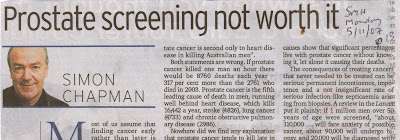
Gee! Me against the Professor of Public Health at the University of Sydney. This should be a one-sided debate.
But here goes. If you've dipped into this blogsite over the past year or so, you'll know I'm passionate in urging mature men to ask their doctor for a prostate cancer check. And although I've read Professor Chapman's article in Monday's Sydney Morning Herald – and was already familiar with the arguments he has put – I will not change my advocacy.
The reason is simple. Early detection of prostate cancer, before any symptoms became apparent, may have saved my life. At the very least, it saved me from having to make decisions about more risky treatment of an aggressive cancer after it had spread further.
I hope you'll bear with me. I'm trying to explain that screening is worthwhile for most mature men, provided the guy (and his wife and friends) understand its limitations.
All treatment options – including non-treatment, ranging from "watchful waiting" to "no point worrying about it at your age" – have risks and shortcomings. What's the right treatment for one guy might be ill-advised for the next.
As I've previously recorded, my wife Merry persuaded me to ask my GP for a prostate check (I've read that 80 per cent of men who do ask are yielding to their wives' nagging).
The GP ordered a blood test for PSA – prostate-specific antigen – which came back a bit high. A digital rectal examination did not reveal any abnormalities, but then, not all prostate cancer can be detected with a probing finger.
So first the doctor treated me with antibiotics. Perhaps I had a simple infection, or perhaps non-cancerous benign prostatic hyperplasia.
The PSA continued to rise, so it was off to see a specialist urologist. After more examination, he performed a biopsy.
The results came back – no cancer had been detected. Merry and I enjoyed a good bottle of wine that night.
But follow-up tests showed an alarming leap in my PSA reading, and the urologist recommended another biopsy. If I remember right (I was zonked out with valium at the time), he told me he had taken 18 tissue samples, and the pathologist detected cancerous cells in just one.
However, the pathologist gave the cancer a Gleason score of seven. Gleason scores rank the cancer's aggressiveness from a relatively benign two to an alarming ten, and seven is at the aggressive end.
There is another vital score called staging – usually T1 through to T4, based on how far the cancer has spread. For me, there wasn't enough information to rank my cancer on what basically is a description.
The urologist referred me to a radiation oncologist, who felt the cancer had already spread into my pelvic lymph nodes. (I know a little about lymph nodes because a surgeon had to remove those under my left arm after melanoma spread its cells – but that was more than 30 years ago.)
After ultrasound and other imaging confirmed his opinion, we agreed radiation treatment would be appropriate. First, however, the radiation oncologist put me on a course of Androcur to stop my body's production of testosterone.
The aim was to starve and shrink the cancer to make it a better target for radiation. But the drug achieved a much better result. PSA tests, imaging and digital examination all indicated the cancer had disappeared or was now insignificant.
It may come back, of course, either as a new cancer or as a flare-up of a few cells which linger. Time will tell, but for now, and until I'm too old for it to matter, I'm happy to accept "watchful waiting" as my treatment option.
The experience of just one guy – me – doesn't have much statistical significance when ranged against studies by medical and academic experts published in peer-reviewed journals. But it still matters to me, and I think it will help me make some worthwhile points.
First, on screening itself: Understand what it can do, and what it can't. Initial screening may give false assurance that the guy does not have prostate cancer. But a good doctor today will use both PSA blood tests and a finger examination, although each technique is imperfect, and perhaps the doctor will also monitor changes over time.
If those techniques lead to concern that cancer may be present in the prostate, it's time to see the urologist. Again, your family doctor – assuming you have one, and don't attend a medical centre where you're just a name on a computer – will be invaluable, suggesting specialists who are not only well regarded for their expertise, but who are also able to explain the diagnosis and treatment options to patients and wives who may be shocked and uncomprehending.
Only one diagnostic tool can reliably confirm prostate cancer and measure its aggressiveness – a biopsy.
But even a biopsy is not risk-free. Apart from the possibility of a false negative result such as I received, it also carries a risk of infection. To collect the tissue samples, a fine, hollow needle has to go through the rectum and into the prostate itself. The urologist will have prescribed strong antibiotics to suppress infection, and something like valium to calm the patient, but things can go wrong.
After all this, however, you should know whether your prostate has cancer, how aggressive it is, and perhaps whether it's metastasising, scattering malignant cells to grow in your lymph nodes or in adjacent bones.
All that's worth knowing, because it helps you make sensible decisions about what to do next.
Indeed, it's vital to know about the full range of treatments you may be offered. How effective they may be, how significant are the risks, or even whether it would be better to have no treatment at all.
Close to the prostate are nerves which control erection, bladder and anal functions, and radiation or surgical treatment may damage them. Some treatments make such damage probable, not just possible.
Let's say you're about 60, healthy and active and enjoying good sex, and your prostate cancer is relatively low on the Gleason scale. Almost certainly, your wisest move is to do nothing, but let your doctors check from time to time – "watchful waiting".
On the other hand, let's say you're over 80 and on to your second pacemaker. Treatment for prostate cancer probably won't prolong your life – you'll die first of something else – but it's likely to diminish the quality of your remaining years. Screening? Why bother?
But between those extremes, what about guys like me? Late 60s, aggressive cancer already metastasising. I'm in reasonable health, and that cancer threatened to shorten my life and perhaps end it with pain. I'm satisfied screening and then treatment was my best option.
However, Professor Chapman's views have strong support. Here's how Wikipedia reports on the issue (there's a link at the end of this post):
Screening for prostate cancer is controversial because it is not clear if the benefits of screening outweigh the risks of follow-up diagnostic tests and cancer treatments.
Prostate cancer is a slow-growing cancer, very common among older men. In fact, most prostate cancers never grow to the point where they cause symptoms, and most men with prostate cancer die of other causes before prostate cancer has an impact on their lives.
The PSA screening test may detect these small cancers that would never become life threatening. Doing the PSA test in these men may lead to over-diagnosis, including additional testing and treatment. Follow-up tests, such as prostate biopsy, may cause pain, bleeding and infection.
Prostate cancer treatments may cause urinary incontinence and erectile dysfunction.
Therefore, it is essential that the risks and benefits of diagnostic procedures and treatment be carefully considered before PSA screening.
And let's note the final words of Professor Chapman's article:
What is urgently needed is a diagnostic test that will accurately predict those prostate cancers which will turn nasty. The tests we have now have poor reliability in that regard. Research funding into the development of such tests is vitally important.
Forgive me for talking so much about my prostate. I know this post is long, and that I have a tendency to preach. But despite the flaws in prostate cancer diagnosis, I still believe screening is valuable for detecting cases such as mine. To get the full benefit, however, a guy needs to understand much more about the diagnostic tools and also the pros and cons of treatment options.
The Wikipedia entry quoted above offers an excellent explanation of prostate cancer and the issues of diagnosis and treatment. And you can read Professor Chapman's article here.






